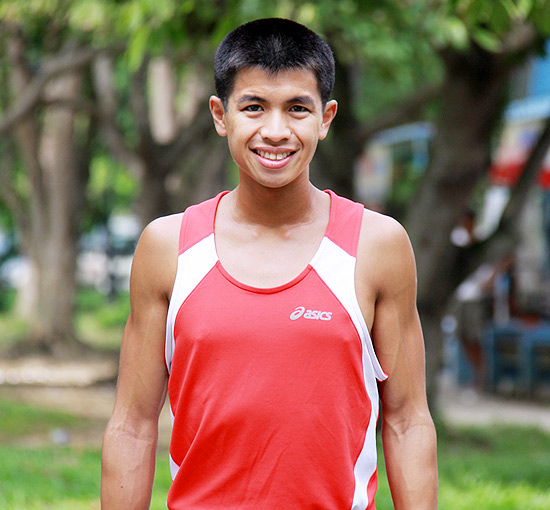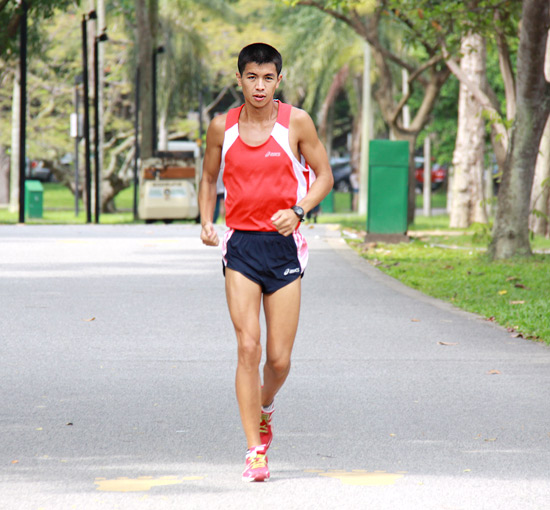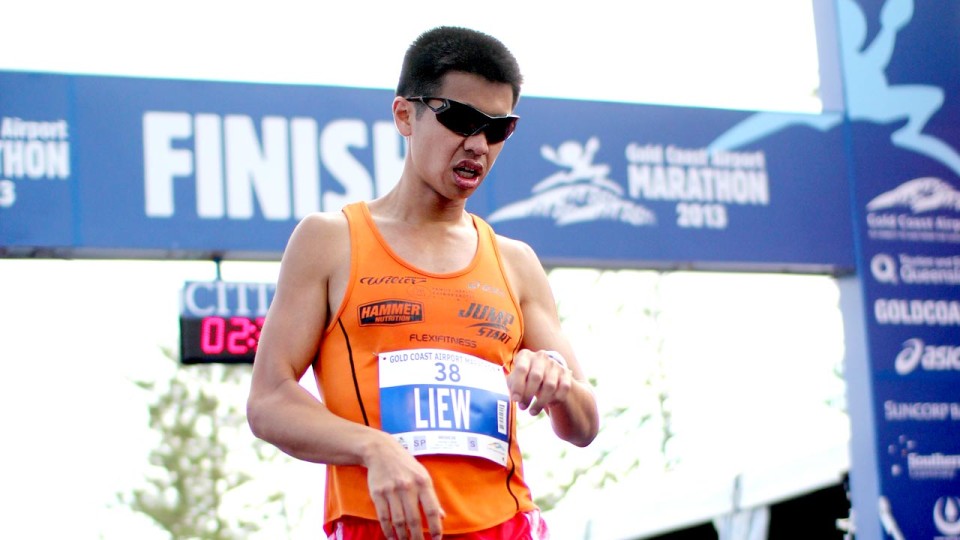Ashley Liew’s story is nothing short of inspirational food for the soul. We’re not just referring to athletes aspiring to attain the highest levels of excellence but the Average Joe on the street too. A late bloomer some might say, his personal best for a marathon stands at 2hrs 41min, achieved at the 2011 Gold Coast Marathon. For many athletes, that’d be it. Not for the 25-year old. He still feels he has more to give. The following are excerpts from RunSociety’s interview with the upcoming star:

Tell us about that transition from non-athlete to serious athlete.
I’ve been a chubby kid all along so in JC (junior college) I wanted to finally look cool and all that. I decided to join my first sports CCA (co-curricular activity) but even then in NS (National Service), I put on a lot of weight. I weighed in my highest at 80kg towards the end of NS. And then I looked at one of my finishing photos of the marathon in ’06, I was quite annoyed with how I looked. So basically that was my turning point. I took up recreational triathlon to lose weight. In a sense from there, I started losing weight. You know, feel better about myself. I had pretty low esteem. Although I appeared okay, I had pretty low esteem inside. So I started experimenting with cutting down my food intake because I was training pretty often back then already but I wasn’t seeing any weight loss, so I decided to watch more carefully what I ate and then I saw some good results. 2009 was when I first got really serious because I was first introduced to my first ever running coach. I don’t know how but he believed in me. He saw potential in me although I was still fat back then and basically through structured training and a lot of belief, I happened to lose weight during that one year. And at the end of that year, I managed to come in 2nd for the Singapore Marathon which was pretty amazing considering I was never a sportsman before. So from there, I’ve just been working very hard to keep at it.
What are your biggest achievements to date besides the StanChard Marathon 2nd place finish?
Besides that, it’ll be things like I finished the Ironman triathlon last year in quite a decent time: 10 hrs 48 min. I just missed out on qualifying for Hawaii by just a couple of minutes but I’ll be trying that again next year. Last year I also was the runner-up for the Singapore half Ironman triathlon which is pretty exciting because I see triathlon and pure running as sometimes different entities altogether, so it was nice to come in 2nd for that race as well. And more recently, it’d be the timing I did at Gold Coast Marathon in July this year, 2011. Managed to come in a decent 2 hrs 41min, personal best. This was despite a last minute injury so it just showed myself I’m capable of doing better.
Any particular milestones you’re aiming for in the near future? What’s the ultimate dream?
For me it’s quite clear. I mean I have two sporting dreams. One would be to race at the Hawaii Ironman World Championships which I hope to do so next year. It’ll be my last attempt at that. But in the longer longer term I definitely want to make it for SEA Games and win a medal at the SEA Games marathon. And even further down the road, I’d be very happy to qualify for the Olympic marathon but I’m looking at really long term because this part demands perseverance and patience that you can’t achieve in a very short span of time and that’s what’s important. Just keep working hard.
So was it running or triathlon first?
In JC2 (junior college year two), I was encouraged by my teammates to just try my first marathon so it was pretty much recreational running first. So I’ve been running the Singapore Marathon every year without fail since 2004. But in December ‘06, in addition, I started my first small triathlon. Since then, it’s been juggling both at the same time. In JC, I joined canoeing and dragonboat. I mean that was my first taste of endurance but it was a different kind of endurance.
Who are your role models?
If you talk about international athletes, I really look up to Paula Radcliffe. Although she’s a mum right now and she’s not young anymore, she still holds the marathon world record which has been untouched since 2003, 2hrs 15min, which a lot of guys can’t even smell. So it’s pretty amazing what she did because although she’s a very good athlete, her story is believable. She has ups and many many downs also so it’s kind of a reflection of what life is I guess. There are many ups and downs but it’s still possible to make the most out of it and I mean closer to home, other role models would be like my mother probably. Yes definitely. I mean she wasn’t really a sportsman or sportswomen but she had a very strong fighting spirit in that sense. Because even when she was diagnosed with cancer, she really fought really well but sadly she succumbed to the disease last year. But as in during this time she was really strong and all that so I think I inherited some of those genes from her. Just that willpower and determination so that’s quite cool.
We understand your girlfriend has been a great source of support. Any others who have been inspirational in your development as an athlete?
To be in this sport, to do what you do, it’s not just the racing. It’s the training you know. Because right now I train twice a day so I definitely need a lot of support on what I do. Definitely I’ve got support from my dad as well. He fully supports what I do. And my coach, Mr. Rameshon. First met him in December ‘08 so he’s been very crucial in my development as an athlete. Basically, I wasn’t a competitive athlete before I met him. He just saw something in me and he’s been working very hard to bring out the best in me and we’ve been quite successful. I think the key is more than just being a coach to an athlete. It’s really about both of us being open to each other. I mean being like almost friends. It’s not like just a one-way thing, so he supports me a lot. He’ll fly up with me for the Gold Coast Marathon and all the way to Hong Kong Marathon although it’s not a must. I mean it’s not a must that athletes fly up with their coaches but I mean having him around definitely helps a lot. Definitely calms me. He’ll offer me advice all the way until the last moment so it’s really reassuring; basically his presence and what he’s doing. He’s still the Singapore Marathon record holder since the 1994 SEA Games: 2hrs 24min. Right now at the moment, he set up a company. It’s called Flexi Fitness. So basically he does like personally coaching in a sense. He has different aspects to it. He just set up a kids programme so that’s pretty cool.
Asics has signed you on as a sponsored athlete but we know it’s not just them. Care to share about the others?
Besides Asics, I mean one of my first few sponsors was actually a bike company. Right now, I’m sponsored by Wilier bicycles so that’s pretty cool because a bike is a very heavy investment so they have taken care of me in that aspect. Then I’ve also got the Family Health Chiropractic Clinic. Basically chiropractic is something I’m actually inspired to pursue in the future so I mean I’m in a sense sponsored by the clinic. I do get to see the doctor pretty often to get myself adjusted and all that. So he basically takes care of my health in a sense. My overall health potential. Then on the other hand, I also got Lynk Biotechnologies which handles energy cream like Jumpstart and also other creams like TTC Glucosamine cream. In addition, my nutrition needs are pretty much taken care of, as in sports nutrition, Hammer Nutrition, so that’s pretty cool. And every athlete needs some kind of nutrition. So they know what I need and we keep in close contact on what exactly needs to be done on the nutrition side.
So you sort of started out with “nothing to lose”. With all those sponsorship deals now and a fair bit of publicity centred around you, we’re sure there’s added pressure to perform at competitive meets. How do you handle it?
I think having some amount of pressure is good as an athlete. Because if you’re an athlete at the START line and you don’t feel any nerves and all that, there’s something a bit wrong with you. Because after all, you’ve invested so much of your training time. I mean even your money into this. So definitely you’ll be a bit nervous about how you’re supposed to perform on race day. But it’s all about taking all that, and channelling it into good energy in a sense; not being too excited about pressure. I mean it’s something that competitive athletes, we have to learn how to deal with you know. I mean last year I didn’t deal with so well because I got too excited at the race start. So I mean this year I’ve pretty much learned a lot from that. I wasn’t too hyped up too at the race start which is good for a sport like a marathon. So it’s just about dealing with the pressure. Just putting it to good use.
This is probably something you’d want to put behind you. If you don’t mind us asking, what happened at the recent StanChart Marathon (3hrs 6min)?
That’s a good question because I’m still trying to figure out as well. My coach and I are still trying to do some post-race evaluation because pretty much the training and the preparation was really good. In fact, maybe slightly better than I expected. And the most important thing is reaching the START line injury-free which I pretty much was. So I was quite surprised at around the 15 to 20K mark, I just started feeling like very fatigue in the legs which shouldn’t be the case because usually I get this kind of feeling in the last 5 to 8K of the marathon. You know although I‘m pushing very hard, I just know it’s not going to be my day because as an athlete, you’re very sensitive to how you feel and by 20K basically my legs, were really nothing left. They were not just aching by then, they were like hurting. Like really in pain and I started like cramping everywhere which is quite unusual because I started out my race pace quite conservatively. So I don’t know so I just accepted it as one of those bad days. I mean we can’t explain everything, why things happen, but it’s alright. I mean that’s the beauty of sports I guess. It’s unpredictable.
Injuries. Any major ones lately?
Thankfully no. I mean last year I did have two major injuries but I’ve since recovered from that. I dislocated my right shoulder while cycling just outside my house. That was a tough one to recover from, especially for the swimming part. And in addition, last year during the bike leg of the triathlon I also fell off so I cut my right foot and basically had to do like 11 stitches on that, so that was another bummer because I couldn’t exercise. I couldn’t really put on my running shoes for one month after that so that was pretty much the worst period of my life. Not being able to exercise. Not being able to get my fix. So I was pretty moody then. Don’t want to end up like that again.
So would you say injuries are an athlete’s worse nightmare?
Yes, in a sense. I mean those two are more like disastrous injuries. I do get small injuries here and there like you know muscle sensation, muscle pull here and there but those are sometimes okay in a sense because as a competitive athlete, you need to really push yourself so basically if you do get injuries, I’m not talking about serious serious injuries, if you do happen to get some injuries, it’s actually showing you that this is what you’re capable of. I mean it’s your body telling you that hey, you’ve pushed yourself pretty hard. Let’s accept this. This is your limit right now but you know you can go further next time if you do it right so it’s like a two-way conversation with your body as well if you look at it.

Before I met my coach, it was really unstructured. As and when I had time, I would just run however much I feel like, or however little I feel like. So since I met my coach, it’s been more structured. Like structured in a sense you’ve got your weekly long runs leading up to a marathon for example, which you definitely cannot miss. It needs to be done because you are running a marathon after all, so you need to train your legs to run long. And then what I also realised is you really need workouts like interval workouts, speed workouts, whatever. Because if you really want to do well. It’s not just about completing a marathon. You really need like speed. Just to give you an analogy, the world record pace for the marathon is run at less than three minutes per kilometre pace times 42 kilometres. I think a lot of people don’t realise the pace. How much these guys are actually pushing during the marathon. It’s 7 plus minutes for 2.4km. So you got to replicate that. I think a lot of people say oh, marathon is just about completing it, just about finishing it. But actually, if you look at how fast these guys are running, it’s pretty mind boggling in a sense.
What’s your next race coming up?
Pretty much early next year will be sort of like return to triathlon season. For example, I’m doing a Singapore duothlon in mid-February. Also doing a sprint aquathlon in mid-February. January, I’m still looking out for the races. There might be a National Cross Country Championships. That one I’ll probably do as well. It’s like more a here and there but the next major one will be the full Ironman triathlon again in Texus in mid-May. Then after that, quite likely to do the Gold Coast Marathon again in July so those are most likely the bigger ones next year
Any words for those looking to get serious into running?
There’s no tricks involved. Basically it’s a lot of hard work and patience so if you’re willing to put in the time, if you’re willing to put in the sacrifices when necessary, chances are you’ll get in that direction. And the last thing is don’t rush to get results. Take it as a long term thing. That way you won’t burn out in the sport.





